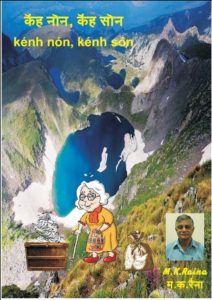
Kènh Nón Kénh Són
Collection of short stories in Kashmiri.
Reviews
Prof. Omkar N. Koul (Linguist) C-13, Greenview Apartments, 33, Sector 9, Rohini, Delhi 110085.
I have enjoyed reading all the short stories in your book ‘kenh non, kenh son’. They are impressive in both content and expression. In content, ‘vath’ presents a reality and touches heart; ‘Zaan Ded’ is our cultural identity under threat and we have to make all efforts to protect it. Others provide enchanting glimpses of our socio-cultural fabric; experiential in nature. The use of everyday language, effective style and appropriate idioms and phrases strengthen the expression.
Dr. B.K.Moza Kolkata
I am thrilled to receive a copy of, yet, another book of Short Stories by Shri M. K. Raina, written in streamlined Devnagri script of Kashmiri language. It is, indeed a great pleasure and privilege to put forth my thoughts that this latest publication of Shri Raina has aroused in my mind and review, as far as possible, its contents. A hundred paged book, published by “Expressions”, Vasai, Dist. Thane 401 202, and priced at Rs. 30.00, contains five short stories in Kashmiri language, revolving on the theme, that the title of this book upholds. The five stories reveal five commonly occurring situations, with in-depth focus on the psyche that is associated with Kashmiri life and the realities thereof. ‘kénh nón, kénh són’, literally means “something apparent and something underneath the depths”, but if one ponders on this thoughtfully, it shapes as a philosophy, a reality which everyone realizes in life that, in our every day happenings there is as much invisible under the layers of time and space as is apparent to the naked eye. As the surface of an ocean reveals a magnitude of panorama as seen by the eyes, but, underneath in its depths, there is a phenomena of time and space which reveals itself differently and diversely at different occasions, as one goes into the depths and looks around with binoculars of perceptions and observation. Mr. M. K. Raina does not require an introduction as, by now, he has become a well-known person in our Kashmiri circles, he is associated with. Born in 1948 in Kashmir, he is by profession an engineer. Till 1990, he remained engaged in Kashmir with postings in different parts of Kashmir which provided his keen eyes an abundance of Nature and its bounties that Kashmir abounds in. This employment, however, did not last longer and with exodus of Kashmiri Pandits, he was also displaced internally, firstly to Jammu for five years as a refugee and then with a shade of better circumstances, he migrated to Mumbai where he is presently based apparently under satisfactory environs of opportunities which he has been in keen look out whole of his life. He has created a world of his own, in Kashmiri literally circles, as a writer of Kashmiri prose and poetry, as a linguist for Kashmiri language, its streamlined Devnagri script and computer friendly fonts, reproducing Kashmiri classics, present day literature that is, surprisingly, getting generated abundantly in different scripts and fonts of Kashmiri language. He is associated with many journals that our Kashmiri Organizations bring out at different places in the country, being a prolific writer of Kashmiri prose and poetry of contemporary interests. It is always refreshing to visit his website: www.mkraina.com This apparent, vast and varied background has provided him an invisible insight with depth, in looking around the minute details of every day life in general and in particular the practices and nuances of a Kashmiri as it obtained in Kashmir before terrorism over there, and now in a widespread diaspora, consequent to Kashmiri Pandit exodus from their ancient homeland. His professional expertise has provided him a unique know-how of engineering and reverse engineering as required in constructing intense plots for complex situations, getting in to attachments and detachments, with microscopic details and photo-finishing of conceived relations and dramas thereof, layer by layer, with high powered lens of his perceptions and observations with visionary breadth of heart and head. This is necessary for constructing a macro structure of happenings of day to day lives as it obtained once upon a time and as it prevails presently. His literary language is simple and sweet, as of a common man in every day life. Having researched Kashmiri Proverbs, Vaaks and Shrukhs, he very skillfully chisels into the depths and engraves jewels of Kashmiri idiom appropriately, to broad band complex situations remarkably and humorously. Though a sufferer of Kashmiri Pandit internal displacement, his writings reveal broad mindedness, associated with Kashmiriyat, maintaining in word and spirit the tenets of communal harmony. He has a keen eye on the injustice that our women-folk have received and the focus is visible to reform the society in this respect. His life has been a visible struggle, as he lost his father in early childhood and was brought up under the care of his great mother and as the saying goes behind his outstanding contributions, there is a woman, his outstanding partner of life and a happy family. This apparent acknowledgement of women greatness is, rightly, becoming visible and focused in his short stories, so are the intense situations through which the down-trodden in our society pass. With this as the background, the first story in this book is about ‘Thuk-shukur’ which beautifully describes the feudal practices followed by land-lords and money lenders in general and in this situation in Kashmir, in particular. “Interest on loan and interest on interests” used to enslave the common man in debts required for performing the marriages of their young ones. Though the system was eradicated in Kashmir immediately after the partition of the country, when the people’s Govt came in power over there in 1947, the practice is still relevant speaking generally. With changed times the values have also changed and this is revealed with great insight in this story where one brother of old values suffers the pangs of this cruel system. But his vagabond brother, whilst totally disrespecting these values, offers timely succor to his brother, in volunteering himself to serve the money lender to pay off the loans, and contrarily makes the life of the money lender miserable by following the literal meaning of the proverbial commands, the latter generally gives, causing great harm to him. The situation, in the process, becomes as tense for the money lender as he prefers to forego the debt and get riddance from the vagabond employee whose services he had agreed to exploit in place of his older brother who was growing weak under the burden of age and prevailing circumstances caused by his adherence to old values and respect for the employer. Kashmiri language is remarkable for its treasures of quality proverbs and idioms which, at times, convey differently than what they literally mean. Mr. Raina has very commendably chosen many such proverbs which the younger brother is making use of in turning the tables in confronting his master by following the literal meaning of the proverbs. The whole drama thus provides a humorous, interesting and literary piece of literature. The second story, ‘Vath’ is focusing on a social situation, faced by Kashmiri Pandits, due to their being discriminated for jobs leading to their migration beyond the limits of the state, in search of bread and butter and subsequently by internal displacement after the onset of terrorism in the state, which caused their large scale exodus from the valley in 1990. The story describes the pains of this migration and displacement and reveals the values of ‘relationship’, which prove mostly superficial at the moments of trials and tribulations. Even amongst the brothers, sharing the accommodation which a migrant brother had created at Delhi becomes unpleasant causing crafty set back to his brother who was displaced, lock stock and barrel by exodus. Though the sister-in-laws had very sympathetic relationship among themselves, the relations grew sour, as generally happens under such situations, between haves and have nots. In the process the parents suffer and die a sad death and the younger brother has no alternative other than returning to Jammu for his survival. With better conditions he works hard, does well and succeeds in having his own residence. On the inauguration day, he invites the elder brother’s family who visit them with an ulterior motive. However, the brotherly relation reveals, blood is thicker than water and the strained relations get once again corrected with changed circumstances. The story ends on an optimistic note when the elder brother wills his Delhi property amongst the two sons, one his own and the other that of his brother. The whole is a brilliant plot of events and details, revealing the pains, migration and exodus of Kashmiri Pandits, has caused in their real lives. The third story ‘Tabdeeli’ is revealing a fascinating drama caused by the transfer, (Tabdeeli) of a dedicated officer in Kashmiri ambience, who had risen from a mechanic to a Head Clerk over thirty seven years of his service. By dint of his dedicated services, attachment of affection and love for his colleagues and moral integrity, he created a niche for himself in the office. As used to happen, this long service had made him possessive of his job and was, therefore, very much upset with the transfer order, a new boss had allowed to take place. As his all efforts to reverse this order, appeared to have not proved purposeful, the dedicated officer gathers courage to accept the reality and prepare himself to face the challenge caused by the transfer. The story reveals the clash of egos and such sensitivities very delicately. He visits the office in another town of Kashmir, in preparation of his move, and is thrilled to find some of the old colleagues who had served him and the respect he was still commanding upon them. As per the Kashmiri calendar, which is an obsession with Kashmiri psyche, it was very auspicious for him to shift to his new office, by noon on a particular day. To be on time he sends his family and some necessities of house hold to the site of his transfer assuming he would rush as soon as the new boss gives him the relieving orders, and reach timely to suit the limitations caused by the calendar. The boss remained busy with some urgent meetings, could be in connection with the efforts he had decided to make in reversing the transfer orders of this Head Clerk, who was an asset to his organization. Just before noon, the boss reaches the office and instead of signing the relieving orders, he gives him the message that he had got his transfer orders reversed. What a climax! He is visibly upset and all his colleagues heave a sigh of relief and congratulate him for having been retained in the same office. The story again is revealing the values old order hath and what it means to keep pace with the changing times. It also describes artistically the relationships that used to exist in offices providing stability, security and self–respect. Even the peon was respected and he was extended all courtesies that used to be in vogue amongst the top heirarchy. Mr. Raina has succeeded in picturing the emotions and feelings as an artist of appropriate words, expressions and meaningful proverbs. The fourth story, ‘Shamima’ describes the communal harmony we used to have in Kashmir which is also referred to as ‘Kashmiriyat’. It details the lives of two families in Kashmir, one a Hindu and the other a Muslim, both living as very close relatives, always at the beck and call of each other. Both have only a daughter, which grow together as very close friends. After graduating from the college, the parents make intense efforts, as is the usual practice, to search for the matches of their daughters and both are married with great expectations. The Hindu daughter, Tosha, migrates to Kolkata where her husband finds a suitable job and the Muslim daughter, Shamima, settles with her husband who, as desired by her parents, was a business man. Though distances create visible barriers, the two families and their daughters remain in close and constant touch with each other. Tosha, in course of time, gives birth to a son and Shamima to a daughter. For some time things are apparently all right, but under the covers, the things turn volcanic with Shamima, as her husband wants to give her a divorce and marry other girl for whom he had long standing infatuation .A storm gets created in both the families but Shamima, being a lady, is destined to suffer. However, the deal is settled and divorce entitles Shamima to monetary benefits and also with the possession of her daughter, Bunty. Shamima’s parents feel distressed with this happening. Shamima, however, gathers courage and she stands by her parents, consoling them that she was, as if, their son, always with them for all intents and purposes. Lot happens in between and she finally joins the school as a teacher despite lot of opposition from her parents. The Head Mistress develops a great liking for Shamima and in her mind wishes her to marry her brother who had recently lost his wife.The Head mistress, creates the situations and gets the remarriage of her brother, though much senior in age, solemnized with Shamima despite all apparent opposition. Originally, it was agreed that Shamima’s daughter would also live with her mother but this does not become acceptable to her husband as someone advises him that this would deprive his son, from his deceased wife, of love and affection from Shamima as she would in that case be partial to her own daughter. Despite all efforts to the contrary, Shamima has to reconcile, being a woman, to leave her daughter under the care of her parents and pass the days with her new husband at the cost of her happiness. Days pass on like this and one day to make the Eid purchases, Shamima’s husband was waiting for her to return from school, when he looks upwards to the nest of a sparrow on the ceiling of his verandah ,where he was waiting. The mother sparrow was comforting her young one when the husband orders to get the nest uprooted. This causes a commotion to the mother sparrow who apparently gets broken down and breast beaten to find her young one killed. This creates a change of heart in Shamima’s husband who now realizes the pain that Shamima must be having, being separated from her daughter. He immediately reverses his aversions and brings her daughter to live with them. Shamima returns from her school and finds to her, immense joy, her daughter and step son playing together as brother and sister. This makes her feel that though her husband was much senior to her in age, he was still with a human heart and she develops great admiration and affection for her husband. With this happy feeling, the story comes to a conclusion with optimism that still there is humanity left in our society. The fifth story is ‘Zaan-Ded’, which literally means the ‘mother of identity’. It portrays the tragedy which our heritage is suffering due to our changed circumstances, displacements and exodus. Zaan Ded weathers the onslaughts in her homeland, refusing to come out, as did happen to the people who were taking her care but were compelled to get displaced for so many reasons. She weathers the snow storms and typhoons but remains in her abode and all the migrants in far off corners fail to reach her to take possession of the heritage that is thus left in the homeland. Whosoever, tries to bring her reaches her alone or when it is too late and in the process they only get killed unable to carry her through the frost and bite of the times. Still, Zaan Ded is hoping against hope that one moonlit night her heirs will appear crossing the barriers of time and space and give her a helping hand. Mr. M. K. Raina deserves all kudos in creating these diverse situations and describing the same in such a lucid language which leaves a deep impression on the minds, difficult to describe. He is now bringing out every year a new publication of his own besides doing the outstanding work of a Karamayogi, in rendering our classical and contemporary literature in streamlined Devnagri and putting it on net for benefit of the general masses.. His publications have a place in our libraries and in the curriculum of Kashmiri language courses. The day is nearing fast when his works will be recognized for literary awards and rewards. It is an eye opener that he has to spend from his pocket for bringing out all these treasures of our contemporary Kashmiri literature. Whilst bringing awareness to this shocking reality, I wish Maharaj Krishen Ji all the best and many laurels and recognitions he deserves.
Author: M K Raina
I am a civil engineer by profession.I have been working on Kashmiri language since 1995. View all posts by M K Raina


